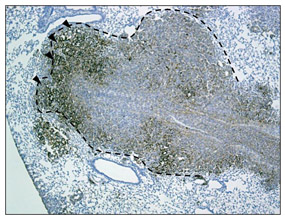Group leader Dr. Thordur Oskarsson
 Metastasis is the spread of cancer cells from their site of origin leading to outgrowth in distant organs and is the cause of most cancer related deaths. To progress into overt metastasis, disseminated cancer cells must resist a non-permissive environment and maintain viability and growth at distant sites. Increasing evidence suggests that cancer cells adapt by engaging and manipulating the microenvironment generating a metastatic niche that promotes cancer cell fitness. To study the metastatic niche our junior research group utilizes 3D culture systems of primary cancer cells, RNA interference, transcriptomic and proteomic screens and various mouse models of cancer progression and metastasis. We have shown that tenascin C (TNC), an extracellular matrix (ECM) protein expressed in normal stem cell niches, is an important component of the metastatic niche and advances metastatic progression in breast cancer. The production of TNC promotes viability of metastasis initiating cells by enhancing the expression of musashi-1, a positive regulator of Notch signaling and by inducing the Wnt target gene LGR5. We are currently dissecting further the pathways modulated by TNC and studying the surface receptors that TNC engages. Moreover, we are analyzing the signaling and functional role of other metastatic niche components in cancer progression with a focus on the ECM. These studies may provide valuable insights into cancer progression and could reveal new targets for therapeutic intervention.
Metastasis is the spread of cancer cells from their site of origin leading to outgrowth in distant organs and is the cause of most cancer related deaths. To progress into overt metastasis, disseminated cancer cells must resist a non-permissive environment and maintain viability and growth at distant sites. Increasing evidence suggests that cancer cells adapt by engaging and manipulating the microenvironment generating a metastatic niche that promotes cancer cell fitness. To study the metastatic niche our junior research group utilizes 3D culture systems of primary cancer cells, RNA interference, transcriptomic and proteomic screens and various mouse models of cancer progression and metastasis. We have shown that tenascin C (TNC), an extracellular matrix (ECM) protein expressed in normal stem cell niches, is an important component of the metastatic niche and advances metastatic progression in breast cancer. The production of TNC promotes viability of metastasis initiating cells by enhancing the expression of musashi-1, a positive regulator of Notch signaling and by inducing the Wnt target gene LGR5. We are currently dissecting further the pathways modulated by TNC and studying the surface receptors that TNC engages. Moreover, we are analyzing the signaling and functional role of other metastatic niche components in cancer progression with a focus on the ECM. These studies may provide valuable insights into cancer progression and could reveal new targets for therapeutic intervention.
Our aim is to identify new components of the metastatic niche and to characterize the interaction of cancer stem cells with the niche. The objective is to determine how the niche supports and maintains metastatic stem cell characteristics and to study the possible role of the niche in resistance to cancer therapy. It is increasingly evident that stem cell properties play an important role in metastasis development and the niche may support and maintain these features. We will pay particular attention to the extracellular matrix (ECM) that has been demonstrated by us and others to be an essential component of the metastatic niche. The function of the ECM extends greatly beyond a structural scaffold and has been shown to be important for cell regulation and modulation of signaling pathways. The ECM components of the metastatic niche support essential functions in cancer progression and effectively help cancer cells to colonize distant organs. Moreover, the metastatic niche may be a mode for disseminated cancer cells to resist therapeutic intervention. We will analyze the role of niche components in resistance to cancer therapy, an attribute that is tightly linked to metastatic progression. The dissection of the metastatic niche and the ECM mediated signalling within the niche, could provide new avenues to therapeutically impair the competence of disseminated cancer cells and prevent metastatic relapse.
